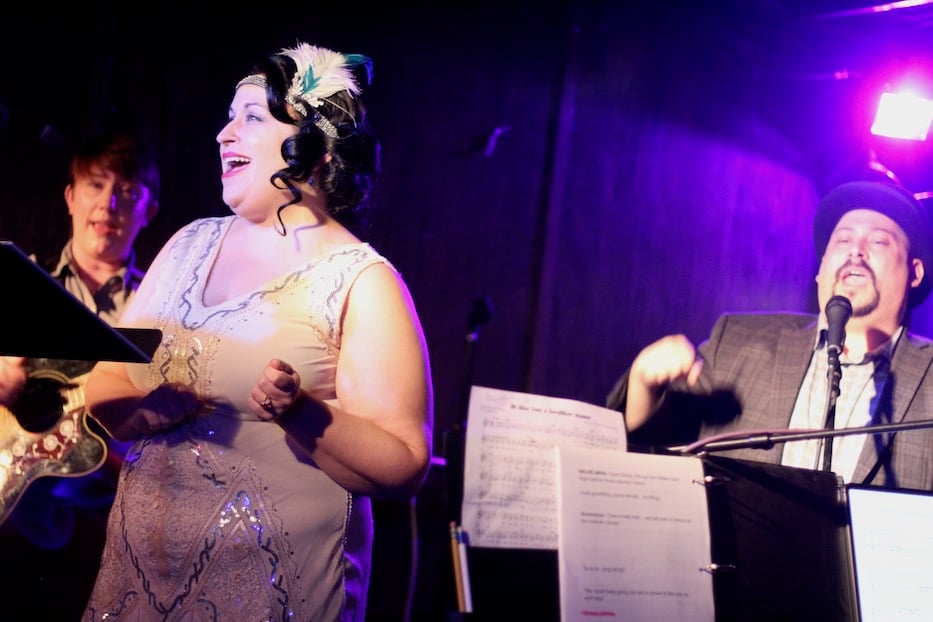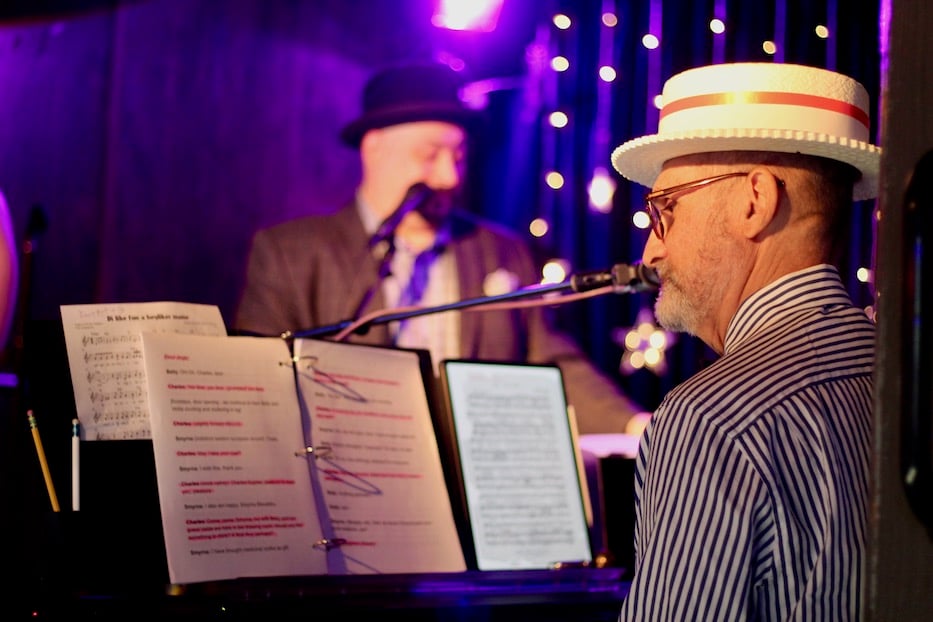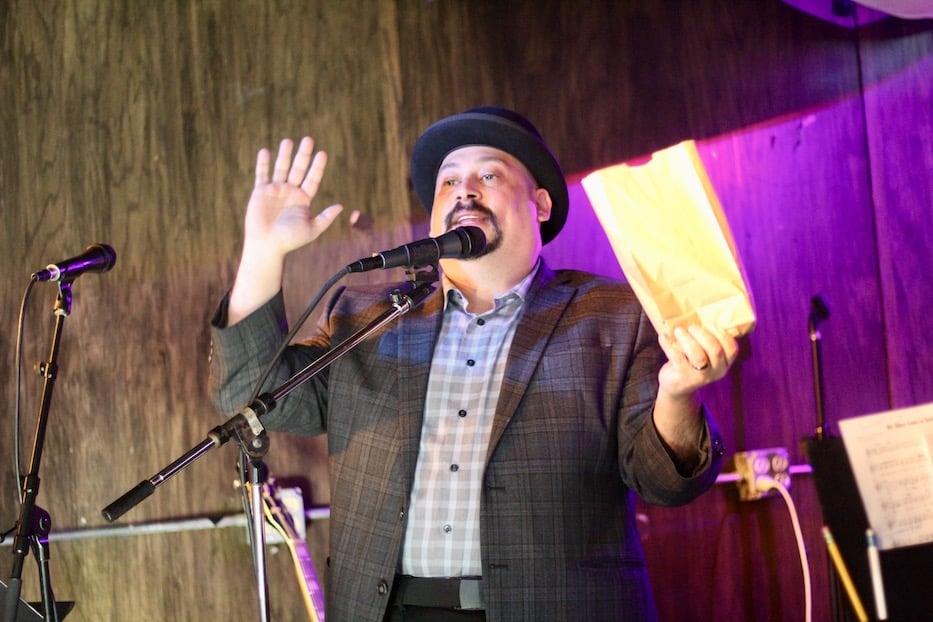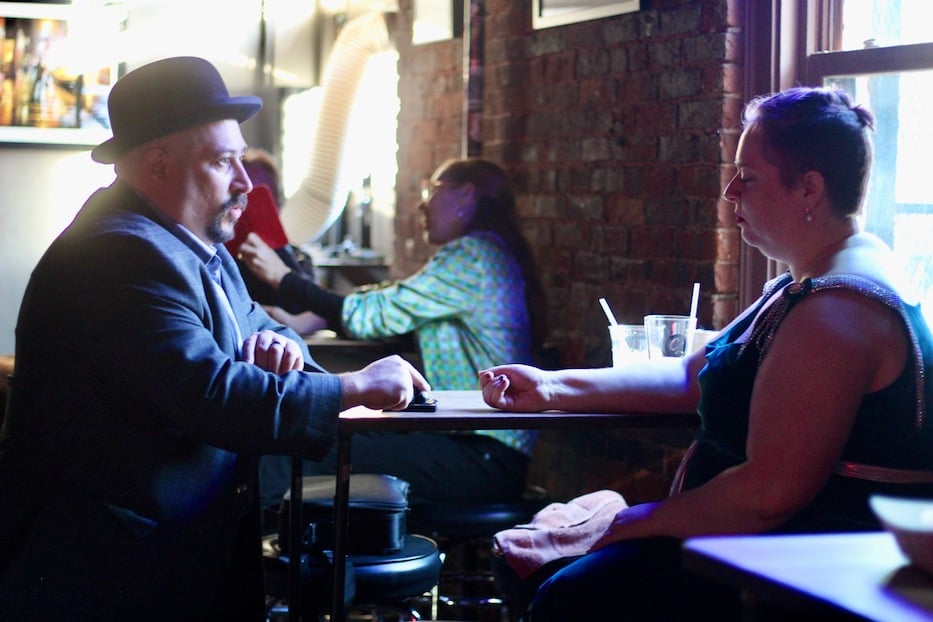.jpeg?width=933&name=ThaliaOct2022%20-%201%20(1).jpeg)
Adam Parisi, Zohra Rawling, Sarah LeMieux, and Bob Scrofani. Lucy Gellman Photos.
The words filled Cafe Nine, floating up toward the tin ceiling as audience members clapped in time with the lyrics. At the mic, Zohra Rawling beamed from ear to ear. Ta-Ra-Raaaaa … Boom-De-Ay! the audience sang. Ta-Ra-Ra Boom De-Ayyyyy! Ta-Ra-Ra Boom-De-Ay! Ta-Ra-Ra Boom-De-Ay! Feet stomped the floor. At the front of the house, Linda Young let the song transport her to another time.
An intimate crowd welcomed the return of Madame Thalia last Sunday afternoon, as the vaudeville revue brought Cafe Nine back to the 1920s with a cabaret and radio show. The exquisite, flapper-dress-sporting, Prohibition Era brainchild of the artist Zohra Rawling, the group pays homage to New Haven history while channeling the spirit of a bygone era—and remembering to be a little silly in the process.
After an unwelcome pandemic intermission, its first show back featured Rawling with performers Sarah LeMieux, Bob Scrofani, Adam Parisi and puppeteer Anatar Marmol-Gagné.
“It felt kind of scary in a way, and also exciting,” said Rawling, an opera singer, beekeeper, multimedia artist and educator who lives with her husband and two kids in West Haven. “We’re family.”

“We’re family,” Rawling said of the performers. Lucy Gellman Photos.
While it is a love letter to that family, it’s also a love letter to New Haven. Born and raised in Flint, Mich., Rawling has long been moved by how proud New Haveners are of their history, she said. The Elm City’s past has always been part of the ensemble’s bones, from early 2017 performances at Lyric Hall to a November 2019 show at Cafe Nine that ended on a cliffhanger.
So when she had the chance to revive the show, she knew exactly where to begin. She headed to the Institute Library on Chapel Street—”really the backbone of the troupe in many ways,” she said—and lost herself in records from the 1920s. Using the library’s archival collection of white and yellow pages, she thumbed through advertisements, enthralled by what she found. She delighted in records from 1830, chronicling everything from A.C. Gilbert’s olympic coaching record to charity organizations of the day to businesses that inevitably changed hands as the years went by.
She kept coming back to the story of Harris R&C Company, a business that pivoted during prohibition—and once occupied the same building at 250 State St. where Cafe Nine now lives in the lowest level. As that business became one part of a radio play, she wrote a universe around it, folding in the histories of now-infamous bootlegger Nellie Green, music in French and Yiddish, crackly advertisements and a sketch of a dinner party where everything is going not-quite-right.

Sunday, performers channeled that history for a giggle-filled two hours, filling the space with constant, mellifluous sound and some real-life magic. As a dramatic, almost regal violet light fell over the performers, Rawling welcomed them in with a dysfunctional dinner party meets radio play, dishes clattering beneath the mic. Nothing, it seemed, was going quite right: one guest was allergic to cassoulet, which happened to be on the table. Another seemed to be trying to outmatch the hostess. A third spoke with a thick Russian accent, remembering the way her mother used to prepare ham.
Parisi, waving two pocket squares in front of the audience, leaned into that laughter. Describing the magic trick he was about to do, he cautioned attendees to be subtle, moving with no subtlety at all. One pocket square made its way into the air; the other stayed tightly balled up in his fist. The joke, not lost on the audience, was that he had killed the magic, and was still interested in the performance of artifice and illusion.
“You must walk around the party looking natural!” he announced to no one in particular, striking a pose that had discomfort written all over it. “At some point, someone will say, ‘Have you had a stroke?’”

Moments later, Rawling was back on the mic, sneak-teaching history one segment at a time. In an advertisement that made 2022 feel more like 1925, she exhorted the city’s old trolley line and then-new bus system, the kinks of which have yet to be worked out a century later. When she moved from transportation to a shout-out to the Institute Library, a cheer rose from the bar, where IL Executive Director Jan Swiatek sat listening.
The cheers stayed as she joked that the building would never get an elevator—a sore spot for the library that may finally end this year, with a new infusion of bonding funds from the state.
Throughout the performance, she returned to the saga of Nellie Green (played by LeMieux with a soft and convincing Irish lilt), dramatic as it reached a crackly, breathy climax on the water, and later a standoff with police in downtown New Haven. She switched gears, reminding New Haveners of the bootlegger tunnels that ran beneath the city, fitting in a few jokes before returning to music. The best: Rawling’s quip that one establishment was singly “ordinary,” invoking the history-drenched watering hole on Chapel Street.
The take on prohibition fit Cafe Nine, a long-loved bar and music venue that is also part of an older, sometimes less varnished New Haven that has largely disappeared. In a space like the cafe—where barkeeps will drop off drinks in the middle of an act, and a performer might call for water or a G&T halfway through the show—there’s barely a fourth wall to begin with. Sunday, performers played with that, stepping behind the curtain of radio before cutting through it, and acknowledging the intimate house before them.
 Parisi teaching attendee (and herself a flutist who has performed with the group) Anna Luther during a short intermission. Lucy Gellman Photos.
Parisi teaching attendee (and herself a flutist who has performed with the group) Anna Luther during a short intermission. Lucy Gellman Photos.
With humor and history, Rawling also reminded attendees that Madame Thalia is a celebration of the arts and artmaking—as they were then, and as they still are now. In Marmol-Gagné and LeMieux’s short film Monday and the Winter Moon, attendees could feel a new part of themselves crack open, suddenly invested in the journey of this young girl, still so small and so far away from home.
As Monday set out on her journey, the clementine-shaped moon rotated above her, and tiny flecks of snow began to fall. It was at once a portal to childhood (LeMieux likened it after the show to Peter and the Wolf, with more women and a puppeteer instead of a narrator) and a feat of artistry, so delicate that it was hard not to crowd the stage for a closer look.
That sense of time bending was everywhere. When LeMieux dipped into Yiddish during the show, she opened a door to a time when it was still commonly spoken between new immigrants from Europe, in an Ashkenazic tradition that young Jews are now working to revive and reclaim. When Rawling stepped back from the mic to bless the stage with an aria, she transformed Cafe Nine into a grand old opera house, the bar and tin ceiling suddenly stately.
As actors returned to their prohibition, eve-of-the-Great-Depression, cassoulet-allergic dinner party sketch, it was a reminder that the world had been on its head before, and that people survived it.
On the corner of State Street—where so much history has transpired even more has vanished—that collision of past and present felt right on time. For two hours, Rawling and a troupe of magic-makers brought them both to life. When they finished, it was by getting the whole bar to sing. Even from the street, the out-of-harmony group must have sounded like a chorus.
“This history is here and it’s written,” Rawling said in a conversation after the show. Her charge is to keep it alive as the group moves into the future.
Learn more about Madame Thalia here. Watch clips from the show in the videos above.